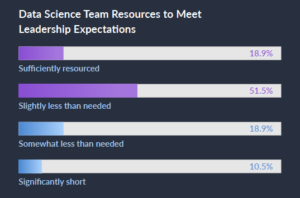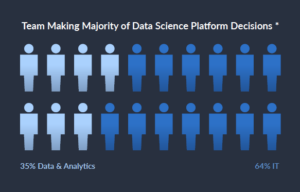
IT Departments Keeping Data Science Purse Strings Tight, Domino Says

(CNStock/Shutterstock)
Company leaders want to use data science to drive revenue growth, but they’re not investing enough to make that happen, according to a new report from Domino Data Lab. The leading cause of the data science funding gap is an overreliance on the IT department to fund data science investment. Unfortunately, IT has better things to do.
Ninety-five percent of companies expect their investments in AI and machine learning to drive revenue growth, with 33% saying they expect to see double-digit increases in revenue as a result of the AI and ML, according to Domino Data Lab’s December 2022 survey of 100 chief data officers (CDOs) and chief data and analytic officers (CDAOs).
That pivot to offensive use cases for AI and ML is a good sign for data science tool providers and the industry, which has often been stuck with defensive use cases of AI and ML, such as detecting fraud or cleaning data. While these defensive use cases often save companies money and time, they aren’t the types of AI and ML deployments that grab and keep the attention of executives and board members.
Unfortunately, fewer than one out of five CDOs and CDAOs say they have the resources necessary to actually deliver the lofty revenue increases that the boards of the companies expect to come from the AI and ML investment, according to the report, which is titled “Build a Winning AI Offense: C-Level Strategies for an ML-Fueled Revenue Engine.”

Source: Domino Data Lab report titled “Build a Winning AI Offense: C-Level Strategies for an ML-Fueled Revenue Engine”
Domino says a big reason why the CDOs and CDAOs aren’t getting the money they need is because the IT department is holding the purse strings and aren’t letting them loose. The survey found that 35% of the data execs say that the data and analytics team had the authority to allocate budget, while 64% of the data execs say that budgeting authority rested with the IT department.
“Data science executives need proper resources, empowerment and support to achieve revenue and transformation goals,” says Nick Elprin, co-founder and CEO of Domino Data Lab. “Boards and the full C-suite must invest in CDOs and CDAOs and put them in charge of people, process and AI/ML technologies, or risk existential competitive pressures.”
While technology like ChatGPT seems to have the entire world talking about AI, planning to use AI, and figuring out how to live with AI, for better or for worse, apparently things are different in the IT department. The survey found that 99% of data execs “find it difficult to convince IT to focus their budget on AI.”
Getting people, processes, and technology in alignment is critical to achieving success with AI and ML, but up to this point, it’s not something that many companies have shown they’re good at. In many ways, despite the immense hype, we’re still in the beginning phase of the AI revolution, and there’s a long way to go before companies reach any sort of proficiency handling this new technology, which requires workers with new skills and new processes to get results.

Source: Domino Data Lab report titled: “Build a Winning AI Offense: C-Level Strategies for an ML-Fueled Revenue Engine”
Other factors besides budget are also hindering progress in AI and ML, including a talent shortage. According to the report, 87% of data execs say “their inability to recruit and backfill data science talent” is hurting them.
Increased focus on governance and ethics is also a factor in where companies are at with their AI and ML journeys. Every single CDO and CDAO told Domino that they have “experienced negative consequences of poorly trained models,” according to the report. Those consequences include lost business opportunities, increased costs, poor decisions, and poor customer experiences. “Everyone is suffering from bad AI,” Domino says in its report.
However, it could be much worse. Nearly half of the data execs surveyed said a failure to properly govern their models could lead to losses of $50 million or more for their companies, while nearly 90% said they expected losses of at least $10 million.
“Being model-driven is essential for success, but CDOs and CDAOs often lack the authority to lead IT and other stakeholders towards these goals,” says Kjell Carlsson, Domino’s Head of Data Science Strategy & Evangelism. “This study clearly demonstrates that they both want and need to take the reins and get on the offense, and the rising tide of data regulations and governance needs makes them perfect for the job.”
Domino’s survey was conducted online by Wakefield Research and involved CDOs and CDAOs at companies with at least $1 billion in annual revenue. The margin of error for the study is 9.8%, according to the report.
Related Items:
Data Governance: Simple and Practical
CDOs Must Shift to Offense, Survey Finds
Companies Going ‘All In’ on AI, Appen Study Says



























